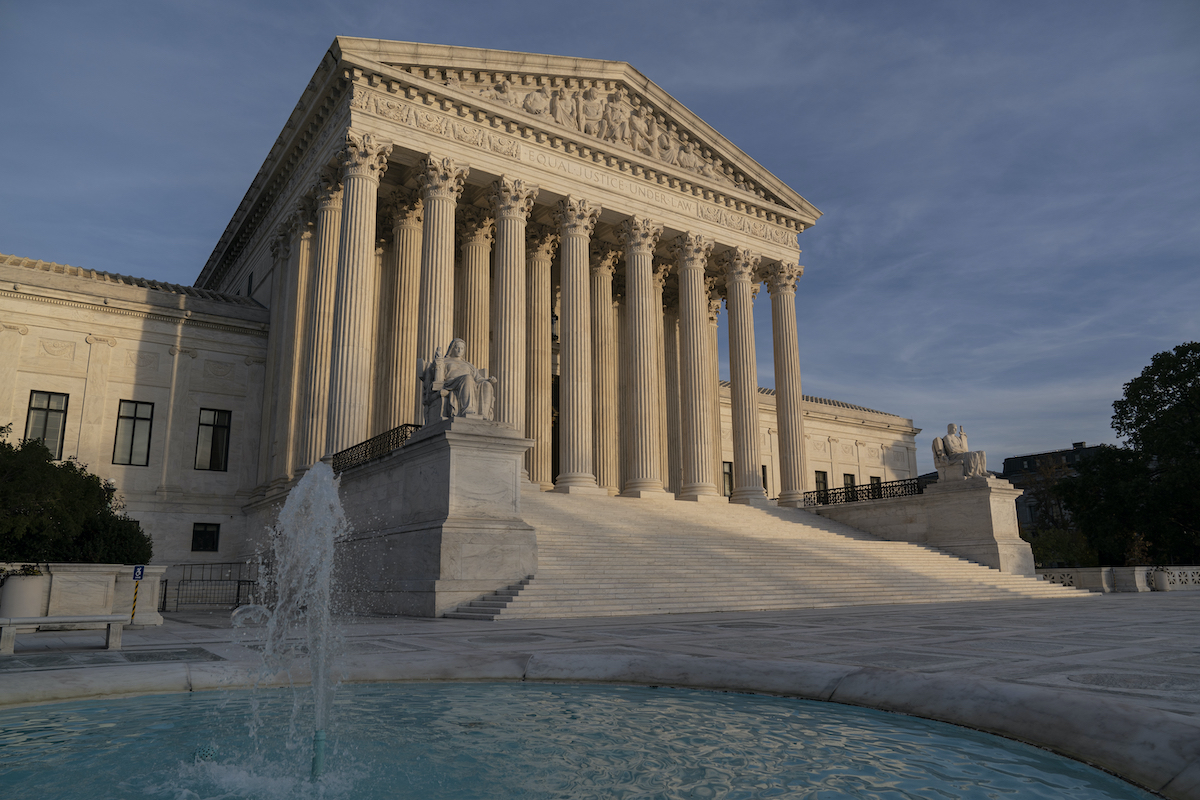

The Supreme Court is seen in Washington, Thursday afternoon, Nov. 5, 2020. The Trump campaign is seeking to intervene in a Pennsylvania case at the Supreme Court that deals with whether ballots received up to three days after the election can be counted. (AP Photo/J. Scott Applewhite)
On Thursday, 12 civil rights organizations and the nonprofit Ayuda Legal Puerto Rico sent a letter to Attorney General Merrick Garland and Solicitor General Elizabeth Prelogar calling on them to “reject the Insular Cases and the racist assumptions they represent.”
“The Insular Cases, as you know, are a line of Supreme Court cases that held that the ‘alien races’ and ‘savage tribes’ in Guam, Puerto Rico, and other U.S. territories acquired as a result of the Spanish-American War were not entitled to the same constitutional rights and protections afforded to residents of the states, nor were they on a path to full political participation,” reads the letter from the American Civil Liberties Union, the Asian American Legal Defense and Education Fund, the Brennan Center for Justice, Dēmos, Hispanic Federation, Human Rights Campaign, and others.
“Like the infamous Plessy v. Ferguson, which justified ‘separate but equal’ racial segregation, and Korematsu v. United States, which endorsed the mass incarceration of Japanese Americans during World War II, the Insular Cases represent a shameful legacy in our Nation’s history. We call on the Justice Department to help dismantle this egregious example of systemic racism by publicly condemning the Insular Cases and bringing an end to any reliance on them in future court filings.”
The letter points to two pending cases in which the Justice Department relied on the Insular Cases in its arguments against extending equal rights to people living in U.S. territories.
In Fitisemanu v. United States, John Fitisemanu, a man born in American Samoa, was denied the right to vote in Utah where he lives. “Because he was born in American Samoa, he is denied the right to vote in Utah based on a discriminatory federal law that purports to label him as a ‘national, but not a citizen, of the United States,” explained Equally American, a non-profit that advocates for equality and civil rights for the citizens of U.S. territories, which is also representing Mr. Fitisemanu and the other plaintiffs in the case.
“Mr. Fitisemanu, and others born in American Samoa, are expressly labeled as second-class Americans,” the group added. “Federal policy requires that his U.S. passport include a disclaimer in all capital letters that ‘THE BEARER IS A UNITED STATES NATIONAL AND NOT A UNITED STATES CITIZEN.'”
Fitisemanu and his fellow plaintiffs asked the U.S. District Court for the District of Utah to declare that American Samoans are U.S. citizens, which the court granted in December 2019. But the Tenth Circuit Court of Appeals then reversed the decision in June 2021, echoing the Justice Department’s arguments based on the Insular Cases.
“In Fitisemanu, a deeply divided panel of the Tenth Circuit relied on the Insular Cases to rule that American Samoa—a U.S. territory since 1900—is not ‘in the United States’ for purposes of the Fourteenth Amendment’s Citizenship Clause, and thus people born there have no constitutional guarantee of U.S. citizenship,” reads Thursday’s letter. “In Fitisemanu, DOJ relied extensively on the Insular Cases to argue that the Citizenship Clause does not apply to people born in American Samoa, despite the fact that people born there are fully subject to U.S. sovereignty, owe permanent allegiance to the United States, and have military service rates higher than any U.S. jurisdiction.”
The case may now head to the Supreme Court, where both the court and the Justice Department will have the opportunity to either reaffirm the Insular Cases or reject them once and for all.
The letter also points to the case of United States v. Vaello-Madero, in which “the Supreme Court is considering whether the denial of Supplemental Security Income to residents of Puerto Rico based solely on where they live violates the Constitution’s guarantee of equal protection.”
“At oral argument in Vaello-Madero, DOJ was repeatedly invited to address the Insular Cases, but did not disavow them,” according to the letter.
“As President Biden stated in January 2021 at the signing of the Executive Order for Advancing Racial Equity, ‘this nation and its government need to change their whole approach to the issue of racial … equity,’ which will require action from ‘every agency,’ including DOJ,” reads the letter. “DOJ’s continued embrace of the Insular Cases cannot be reconciled with this administration’s pledge to affirmatively advance equity and racial justice.”
“The Biden-Harris Justice Department should be ashamed to continue relying on the racist Insular Cases to defend the perpetuation of a colonial framework in U.S. territories,” said Neil Weare, president and founder of Equally American.
“This letter is especially timely as the 100th anniversary of Balzac v. Porto Rico —the last of the Insular Cases— approaches on April 10th,” he added. “That would be an appropriate time for the Biden-Harris Justice Department to reject the Insular Cases as DOJ has other racist Supreme Court decisions.”
The complete letter is below:
***
Hector Luis Alamo is the Senior Editor at Latino Rebels and hosts the Latin[ish] podcast. Twitter: @HectorLuisAlamo


